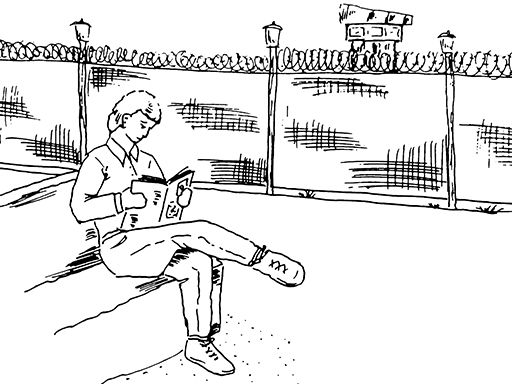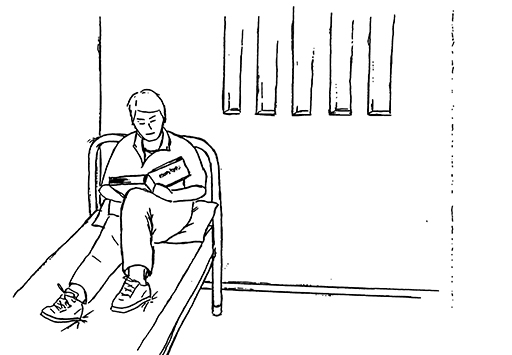1.1 Helping the passage of time
One of the ways of coping in times of adversity such as these, is through activities which not only pass the time, but help to expand the limitations of the space you are in. You can also develop skills for use in the future, when the constraints are lifted, and where new ideas and abilities are needed. In the following reflections, David and Michael outline some of the ways they maintained their physical and mental wellbeing while in isolation and confinement.
Reflection: David
Different people can take different views on coping with the loss of freedom, depending on their outlook. There is denial. Pretend It isn’t happening. There is diversion. Just keep doing something else. There is clinging to hope. Something will turn up. And there is rationalisation. I am in this position because…There is coping by knowing you are in a group going through the same experience. I see parallels on a social level with today.
For me, reading was very important. Some of us set up our own book club. We would buy jointly then share the books. Reading was a means of escaping the immediate situation. I recall on different occasions of reading a book through from start to finish in one go. One such book was Hugh Trevor Roper’s, The last days of Hitler – an amazing story and well written. In hospital one time I had The Crossman Diaries and The Gulag Archipelago by Aleksandr Solzhenitsyn which passed many hours.
Then I had the Open University material. I’m not sure how my interest in Psychology developed but it was interesting and could be related to my situation of imprisonment. Even more useful and tangible was the Social Sciences course on the justice system. It dealt with police, law, courts and prison. The OU was a means to structure time. It was learning and it was challenging and constructive. Many hours were used up in typing (I learned to type in prison) various essays. There were experiments. I once taught fish to learn the difference between colours and shapes!
There was always an ongoing battle between myself and the prison authority but especially the security department. I had a lot of problems getting books into prison. Quite often I had to lodge a written submission to the governor. This was mostly turned down on security grounds which could not be challenged or explained. I finally decided that I had nothing to lose and made a written request for the book Pole Vaulting for Amateurs. I didn’t even get a reply to that one! Books on hypnosis were strictly forbidden.
Another aspect to my day to day routine was artwork. There was a huge resource of talent in the cage [Compound]. I learned to paint on glass which became my preferred art mode. I also dyed leather, completed pencil drawings, dabbled with oil and water colours and painted large scale murals on the walls of the hut.
Reflection: Michael
When in prison, we lived according to a routine, which mostly was of our own invention. For example, get up early and get a few hours reading/studying done – breakfast, exercise, some social interactions, food, back to reading or OU essay/note reading in prep for essay. Most Open University courses allowed for a lot of ‘supplementary’ reading which could always be incorporated into formal work. I found it amazing that even reading fiction could assist in getting essays done. I found that in studying Arts, psychology and particularly Social sciences – almost anything in the world became relevant to the courses I was doing.
I was initially reluctant to do the ‘Arts’ course, but basically I had no option. So I went for it. From literally nowhere I got insights I never had – not only into how to interpret things – but how to view the world from slightly differing view points. Doing other courses under Social Sciences had opened my eyes but this Arts course brought things home to me. I see that as something like Woody Allen’s comments about having read the book Animal Farm. He said he enjoyed it – ‘it was all about pigs’. Well I suppose that if we take away the exaggeration, that could have been me as a younger man taking things at a face value instead of looking to see if there is hidden meaning – even in jokes. It is obvious when you think about ‘sarcasm’ or ‘irony’ – how do they really work if you don’t know that the meaning is not really in the words used? When I read Umberto Eco’s book The Name of the Rose I then read up on the author Eco and found out about semiotics/semiology – the interpretation of signs/hidden signs or signals which are all around us. Fascinating learning there for me. Studying the Arts also led me onto dabbling in artwork – painting, developing my calligraphy writing abilities – all as a result of my developed interest in these things I used to have no interest in.
Of course, in tandem with me as a student escaping through my mind, as a political prisoner my thoughts were also on real escape. Today is very different for us all in that the confinement is for our benefit and I see the ‘isolation’ as a positive – full of opportunity to try new things. I have already pretty much got new daily routines – though I have to consciously think and remember them – but I am coping OK given that I am fortunate enough to have a mobile phone, computer and TV – many do not.
Not everyone has the desire to broaden their outlooks on the world by reading, studying or whatever, but most people do interact with matters other than the humdrum of their own lifestyles. They watch TV, shop, read etc. So I would suggest to people –be open to alternatives – try learning something new. You might be would be amazed at what you will find and where it will take you.
In the following conversation, Michael and David discuss the creative ways in which they passed time, found peace of mind and ways to escape, while in lockdown in the 1970s and 1980s.
Now listen to Audio 1.
Audio 1 transcript (Word document) [Tip: hold Ctrl and click a link to open it in a new tab. (Hide tip)]
Activity 3 Using your mind for solace and escape
Having listened to the audio, try to answer the following questions:
- What most sparked your interest in this discussion between David and Michael?
- Was there anything that surprised you?
- Were there any ideas that were relevant to your situation today?
Discussion
You may have been interested in how David and Michael continued to develop themselves personally and politically during their imprisonment and how they expanded their horizons through their imagination and ideas. They also highlighted:
- the value of shared storytelling
- the power of a good book to take you elsewhere
- the importance of a longer-term project to pass the time, to provide a sense of purpose and develop new skills.
In David and Michael’s case, who both faced many years in prison, this involved undertaking a degree with The Open University. But any level of formal education from a short course to a full degree can be beneficial.
Another point mentioned in the discussion above was the role of time management. This will now be explored in more detail in the next section.


